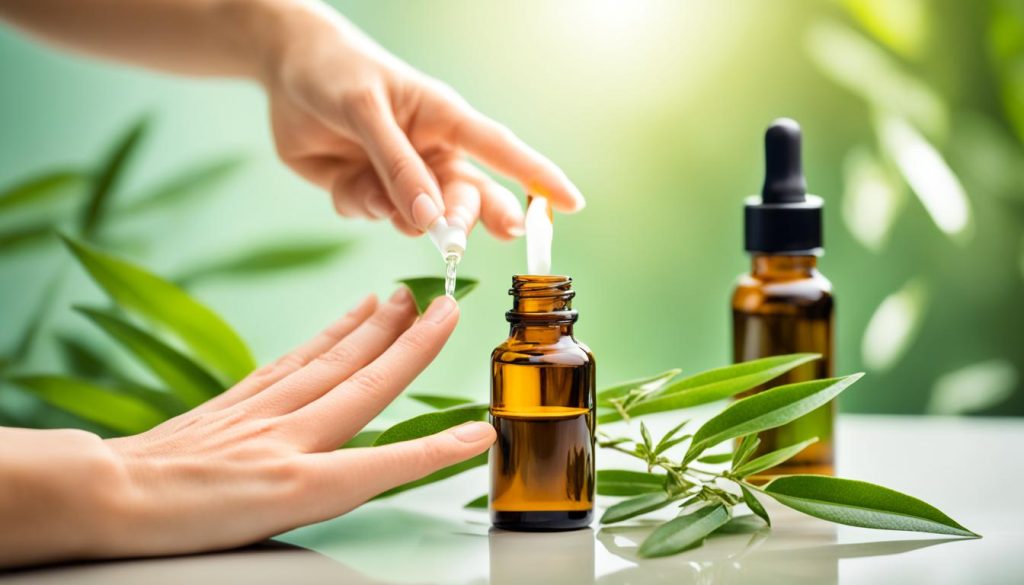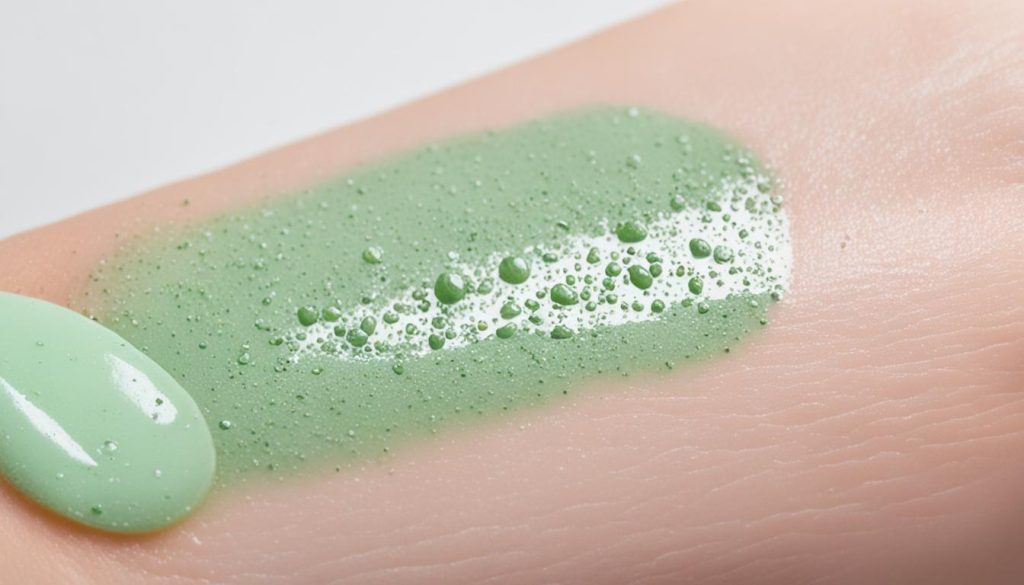Tea tree oil has gained popularity for its numerous benefits for the skin. From treating acne to soothing dryness and irritation, tea tree oil is a versatile ingredient in skincare. But can you put tea tree oil directly on your skin? Let’s find out!
Tea tree oil, also known as melaleuca oil, is an essential oil derived from the leaves of the tea tree plant. It is known for its anti-inflammatory, antimicrobial, and wound-healing properties. These properties make it an effective remedy for various skin conditions, including acne, skin infections, and dryness.
While tea tree oil offers many benefits, it’s important to use it correctly to avoid skin irritation or reactions. It should always be diluted with a carrier oil before applying it to the skin. The recommended ratio is 1 to 2 drops of tea tree oil with 12 drops of a carrier oil, such as olive oil or coconut oil.
Prior to using tea tree oil on your skin, it’s essential to do a patch test to check for any adverse reactions. Apply a small amount of the diluted tea tree oil to a small area of your skin and wait for 24 hours to see if any redness or irritation occurs.
Can You Put Tea Tree Oil Directly on Your Skin?
When applying tea tree oil to your skin, be sure to avoid the eye area as it can cause redness and discomfort. Massage the diluted oil onto clean, dry skin and allow it to absorb. It can be used daily or as needed, depending on your skin condition and preference.
While tea tree oil is generally safe for most people, some individuals may experience skin irritation or allergic reactions. If you notice any adverse effects or if your symptoms worsen, discontinue use and consult a healthcare professional.
Benefits of Using Tea Tree Oil for Skin
Tea tree oil offers a wide range of benefits for the skin, making it a popular choice for natural skincare routines. Its powerful properties make it effective for treating various skin concerns and improving overall skin health.
1. Acne Treatment
Tea tree oil is renowned for its ability to combat acne. Its anti-inflammatory properties reduce redness and swelling, while its antimicrobial properties help kill acne-causing bacteria. By incorporating tea tree oil into your skincare routine, you can effectively manage and prevent breakouts.
2. Treatment for Skin Infections
Tea tree oil’s antifungal properties make it effective in treating skin infections, such as fungal infections. It can help alleviate symptoms, promote healing, and prevent further infection.
3. Soothes Skin Conditions
Conditions like eczema, psoriasis, and dry skin can cause discomfort and irritation. Tea tree oil can provide relief and soothe these conditions, helping to alleviate itching, redness, and inflammation.
4. Wound Healing and Scar Reduction
Tea tree oil promotes wound healing and can be used to treat cuts and wounds. Its antibacterial properties help prevent infection and its regenerative properties assist in minimizing the appearance of scars.
5. Enhances Skincare Products
Tea tree oil can be incorporated into skincare products to enhance their effectiveness. It can be added to moisturizers, toners, and serums to improve the overall health and appearance of the skin.
| Tea Tree Oil Benefits | ||
|---|---|---|
| Acne Treatment | Reduces inflammation and kills acne-causing bacteria | |
| Treatment for Skin Infections | Effective against fungal infections | |
| Soothes Skin Conditions | Relieves eczema, psoriasis, dry skin | |
| Wound Healing and Scar Reduction | Promotes healing, reduces scarring | |
| Enhances Skincare Products | Improves overall skin health and appearance |
As you can see, tea tree oil offers numerous benefits for the skin. Whether you’re dealing with acne, skin infections, or specific skin conditions, incorporating tea tree oil into your skincare routine can help improve and maintain the health of your skin.

How to Use Tea Tree Oil on Your Skin?
Tea tree oil is a versatile essential oil that can be used to address various skin concerns. To ensure safe and effective application, it is important to follow proper usage guidelines.
Dilution Process
Prior to applying tea tree oil on your skin, it must be diluted to avoid any potential skin irritation or adverse reactions. The ideal dilution ratio is 1 to 2 drops of tea tree oil with 12 drops of a carrier oil.
Common carrier oils that can be used for dilution include:
- Olive oil
- Coconut oil
- Almond oil
These carrier oils aid in minimizing the potency of the tea tree oil and help ensure safe application.
Application Methods
Tea tree oil can be incorporated into your skincare routine in various ways.
1. Mix with skincare products: You can add tea tree oil to your moisturizer, toner, sunscreen, or clay mask. This allows for convenient and controlled application.
2. Specific skin concerns: If you are targeting acne or wound healing, tea tree oil can be added to creams or ointments for more targeted treatment.
Patch Test
Prior to widespread use, it is essential to perform a patch test to check for any adverse reactions. To do this:
- Dilute tea tree oil with a carrier oil as mentioned earlier.
- Apply a small amount of the diluted mixture to a patch of skin, such as your inner forearm.
- Wait for 24 hours and observe for any signs of redness, swelling, or irritation.
- If no adverse reactions occur, the tea tree oil can be safely used on your skin.
Application Technique
When applying tea tree oil to your skin:
- Ensure that your skin is clean and dry.
- Take a small amount of the diluted tea tree oil mixture and apply it to the desired area.
- Gently massage the oil into your skin until it is fully absorbed.
Tea tree oil can be used daily or as needed, depending on your specific skin condition and personal preference.
Precautions for Using Tea Tree Oil on Your Skin
While tea tree oil has many benefits for the skin, it’s important to use it with caution and take certain precautions. Tea tree oil should not be applied directly to the skin without dilution, as it can cause skin irritation and redness. It’s recommended to use tea tree oil in appropriate concentrations, such as 1 to 2 drops of tea tree oil with 12 drops of a carrier oil to ensure tea tree oil safety for skin.
Prior to using tea tree oil on your skin, it is advised to conduct a patch test to check for any allergic reactions or sensitivities. This can be done by applying a small amount of diluted tea tree oil to a small area of your skin and monitoring for any adverse effects for 24 hours.
Tea tree oil should be kept away from the eye area to avoid irritation, as it can cause discomfort and redness if it comes into contact with the eyes.
If any skin irritation or discomfort occurs after applying tea tree oil, it is recommended to immediately discontinue its use and rinse the affected area with water.
It is advisable to consult a healthcare professional, especially if you have skin conditions or compromised skin, before using tea tree oil to ensure it is safe and suitable for your specific situation.

Risks of Applying Tea Tree Oil on Skin
| Risks | Description |
|---|---|
| Skin Irritation | Directly applying undiluted tea tree oil to the skin can cause redness, itching, and discomfort. |
| Allergic Reactions | Some individuals may be allergic to tea tree oil and may experience allergic reactions such as rash, hives, or swelling. |
| Sensitivity | Even diluted tea tree oil can cause skin sensitivity in some people, leading to irritation and redness. |
| Eye Irritation | Tea tree oil should be kept away from the eye area, as it can cause eye irritation if it comes into contact with the eyes. |
| Pre-Existing Skin Conditions | Individuals with pre-existing skin conditions or compromised skin should exercise caution when using tea tree oil and consult a healthcare professional. |
Tea Tree Oil for Specific Skin Concerns
Tea tree oil is a versatile natural remedy that can effectively address various skin concerns and conditions. Its powerful antimicrobial properties make it a popular choice for treating acne and reducing breakouts. The oil’s antibacterial properties help to combat acne-causing bacteria and reduce inflammation, promoting clearer and healthier skin.
Beyond acne, tea tree oil also possesses antifungal properties that make it effective in combating skin infections caused by fungi. The oil’s ability to kill off fungal organisms helps to alleviate symptoms associated with these infections, providing relief and promoting healing.
For those dealing with dry and itchy skin conditions like eczema and psoriasis, tea tree oil can be a valuable natural solution. This essential oil’s soothing properties can help to reduce irritation and inflammation, providing relief for individuals suffering from these chronic skin conditions. Although scientific research on tea tree oil’s efficacy in treating psoriasis is limited, anecdotal evidence suggests that it may offer some benefits.
In addition to its antimicrobial and anti-inflammatory properties, tea tree oil also promotes wound healing. Its ability to accelerate the healing process can be beneficial for treating cuts and wounds, aiding in their recovery and preventing infections.
In summary, tea tree oil offers a range of benefits for specific skin concerns. From its acne-fighting properties to its efficacy in treating skin infections, eczema, and psoriasis, this natural remedy provides a holistic approach to maintaining healthy skin. Additionally, its wound-healing capabilities make it a valuable asset for treating cuts and wounds. When using tea tree oil for any skin concern, it’s important to dilute it properly and perform a patch test to check for any adverse reactions.
Tea Tree Oil Hair and Scalp Treatment
Tea tree oil is not only beneficial for the skin but also for the hair and scalp. It can be used to treat various hair and scalp conditions, providing numerous benefits for overall hair health.
1. Removing Excess Oil and Buildup
One of the key advantages of using tea tree oil for hair is its ability to remove excess oil, dead skin cells, and buildup from the scalp. This helps to keep the scalp clean and healthy, promoting optimal hair growth.
2. Clarifying the Scalp and Preventing Dandruff
Tea tree oil has clarifying properties that help to balance the scalp’s natural oils and prevent dandruff. By gently removing impurities and controlling excess oil production, it effectively tackles dandruff and promotes a clean, flake-free scalp.
3. Unclogging Scalp Pores
A congested scalp can lead to hair loss and other hair problems. Tea tree oil can help unblock scalp pores, allowing the hair follicles to breathe and promote healthy hair growth.
Incorporating Tea Tree Oil into Hair Care Routine
To enjoy the benefits of tea tree oil for your hair and scalp, consider adding it to your regular hair care routine. You can mix a few drops of tea tree oil with your shampoo or conditioner, or use products specifically formulated with tea tree oil for the scalp.
It’s important to follow the instructions provided by the hair care products and to discontinue use if any adverse reactions or irritation occur.

Adding tea tree oil to your hair care routine can promote a healthy scalp, prevent dandruff, and improve overall hair health.
| Benefits of Tea Tree Oil for Hair and Scalp |
|---|
| Removes excess oil and buildup |
| Clarifies the scalp and prevents dandruff |
| Unclogs scalp pores |
Conclusion
Tea tree oil is a versatile ingredient that can be a valuable addition to your skincare routine when used correctly. With its antibacterial, anti-inflammatory, and wound-healing properties, tea tree oil has various benefits for the skin. It can effectively address common concerns such as acne, skin infections, and dryness.
To ensure safe usage, remember to dilute tea tree oil with a carrier oil and conduct a patch test before application. This helps protect against adverse reactions and skin irritation. Additionally, consulting a healthcare professional is recommended, especially if you have sensitive skin or existing skin conditions.
By incorporating tea tree oil into your regular skincare regimen, you can promote healthy and radiant skin. Remember to follow the proper direct use tips, prioritize tea tree oil safety, and take necessary precautions for optimal skin care results.





